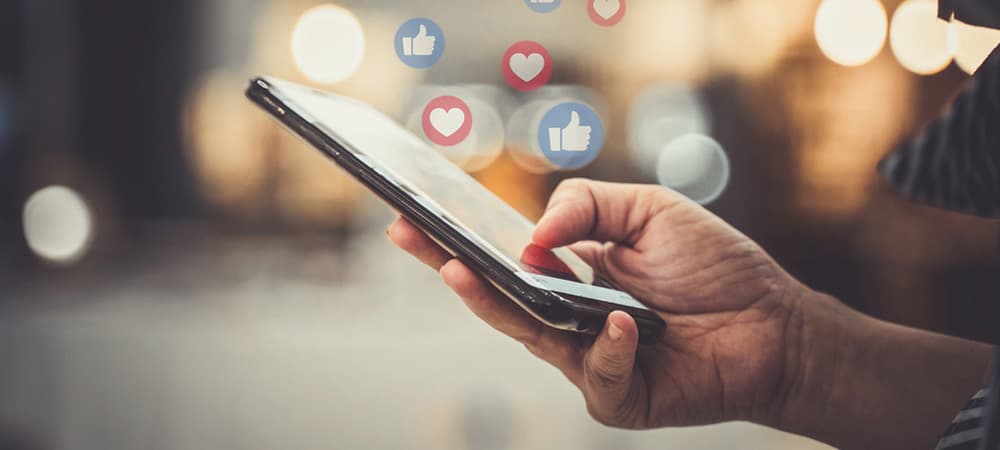We use cookies to offer you a better experience. For more information on how we use cookies you can read our Cookie and Privacy Policy.
8 Reasons Why Social Media is Bad for Your Data Security (And Why It’s Good)

Social media is everywhere. In some ways, it’s made the world feel smaller by bringing distant people together, reuniting long lost relatives, and otherwise giving people a space to connect. However, as social media has grown over the years, so has the risk of data breaches.
As more and more information gets placed online, there is an increased danger of hackers, companies, and malicious interlopers mining your data in ways that undermine personal privacy. And in some cases, your data is outright stolen.
In our modern world, do we trade our use of social media for data by giving up our right to privacy and the preservation of sensitive, personal information?
Below, we will examine why social media is bad for your security and what makes it rife for harvesting data in the first place. In addition, we’ll show why social media is good so internet-users can be more aware of the steps they can take to shore up their accounts from unwanted tampering and data-gathering.
Social media by the numbers
The global use of social media has risen dramatically thanks to the spread of the internet and the advent of cheaper technology. As it stands today, the number of social media users is estimated at 3.196 billion, up 13 percent year-on-year.
The heavy hitter in the social media world, of course, is Facebook with 1.86 billion active monthly users. Facebook is also the social media channel arguably under the most scrutiny for its various data breaches and security concerns, especially over the Cambridge Analytica scandal.
With those kinds of numbers and widespread usage, it’s easy to understand why that data is valuable. The point of social media is to strategically target ads to users who are likely to click on them. By converting those users to consumers, companies make money. In fact, online social media ads brought in $40 million in revenue last year.
Bottom line: the better advertisers can target ads and the more relevant the ads are to your interests, demographics, location, and political leanings, the more likely you’ll convert. So, big data means big money.
You may not put much thought into what you “like” on Facebook and what company pages you follow, but each click gives advertisers more access to your personal data than you might think.
Why is social media bad for your data security?
With any service that puts a premium on personal information, there will be risks that your data will be exposed whether by accident or through security loopholes. Below, we’ve laid out some examples of major flaws within different social media platforms and what kind of data is at stake. Here are 8 reasons why social media is bad for your data.
1. Closed groups and discrimination
There are specific social groups on Facebook, some of them are based on medical issues and addiction. Users share their experiences and issues freely in these groups, believing that a “closed group” affords them some anonymity. Unfortunately, a Sky News investigation found these groups can easily be found alongside membership lists.
So, what’s the big deal?
Although insurance companies aren’t supposed to discriminate against pre-existing conditions, not all of them are scrupulous when it comes to following this law. Insurance companies and employers who find personal information can use it against you to either drop you from your coverage or fire you from your current position.
In one case, one woman’s home insurance company canceled her coverage because they claimed she had a dog that was a dangerous breed not allowed under the terms of her policy. How did they find this information out? Through a social media post on Facebook. The woman was eventually able to reinstate coverage after proving her dog’s breed. However, these kinds of instances of social media screening are becoming more and more frequent.
If you’re applying for a job, it’s likely that the company will do a cursory screen of your social media to filter out candidates who have any glaring red flags like negative posts about past employers, hate speech1. , or other questionable behavior.
For employers, this social media searching is a gray area, especially if it results in discriminating against someone in a protected class. With that said, it’s important to be savvy and cautious about what you post on social media, you never know who might be looking. This is especially true if your account is public with relaxed security settings.
The information you post can also be used for a whole host of nefarious purposes like building up a fake profile, for example. This leads to the next major issue as to why social media is bad for data security.
2. Fake profiles and impersonation
Online criminals target social platforms because your account is rife with personal information they can use for a variety of purposes. The information gathered can be used against you via blackmail or to impersonate you.
3. Spam, viruses, and malware
Social media is a better, faster way to spread malicious content like scams and malware - more so than the run-of-the-mill spam emails you see asking to help out a Nigerian prince in your inbox.
Why is this the case? When someone gets a link from their friend or a social media contact, they’re much more likely to click the link as they have no reason not to trust it.
Take this famous virus: the fake “Facebook Videos” phishing scheme. You get a link from a friend, the title suggests it’s a video with you in it. Then, a popup appears for a “Facebook Videos” login screen. If you type your login credentials into this popup, you’re handing over your password and username information to the scammer. Then, the scammer uses that information to send the same video to all of your friends.
4. Opening credit cards and bank accounts
If a cybercriminal gets enough of your information, he or she can also open a credit card or bank account in your name.
All they need is your Social Security number, your name, your birthdate, and address in order to take out loans or credit cards in your name.
Hackers may also be able to intercept your tax refund by turning in a fake tax return with just a birthday, name, and Social Security number. You might only find out when your own, real tax return gets rejected by the IRS.
Again, hackers often use phishing scams to get these sorts of credentials where you unknowingly hand over sensitive information.
5. Business fraud
If cybercriminals get ahold of an account, they can believably trick people into thinking they are legitimate businesses. Then they can funnel money straight into their pockets by persuading unsuspecting parties to provide credit card information for products they’ll never receive.
6. Access tokens and third-party apps
British Consulting firm Cambridge Analytica took the data of at least 87 million users without their knowledge after harvesting that data from people who partook in a third-party quiz app. Cambridge Analytica then sold this information to the Donald Trump campaign.
The catch? 87 million people didn’t take the quiz. The app took advantage of a Facebook loophole that allowed it to get the information from the quiz but also all of their friends’ data and information as well.
In addition, Facebook had another huge breach in 2018 that may have exposed as many as 50 million accounts. A new video uploader introduced bugs that potentially allowed hackers to obtain a user’s access tokens which are linked to any other service or page a user is logged into with his or her Facebook credentials.
7. Location-based apps
Most people’s smartphones already automatically track and collect location data. Social media apps are especially interested in their data because it gives insight into your habits and whereabouts which advertisers can use to target ads to you at certain times of the day.
Without any true guidance or legislation guiding these services in the US, there’s a ton of leeway with how this data is used. In addition, there are major security concerns with these apps. Location data can be targeted by burglars or stalkers because of geo-location information that’s shared by them.
8. Invasive privacy agreements
Privacy agreements on many social media apps state that the content users upload including pictures, videos, and messages are owned by the platform, even if you decide to delete your account.
Why is social media good for your data security?
Although social media is full of examples of how it can be misused and manipulated, there is also a silver lining: it forces users to more closely examine their own expectations, privacy settings, and security concerns.
Here’s a list of what to look for in a privacy policy before signing up to join any social network:
1. Who has ownership over the data a user posts or uploads?
2. Where does the data go when a user’s account is closed or deleted?
3. How do users stay informed about privacy policy changes?
4. Where and how can a user complain about a privacy breach?
5. How long is personal data stored for?
In addition, you’ll want to follow the tips below to make sure that all of your social media platforms are at the most secure level. At the very least, you should know what privacy settings you currently have and how they can be changed.
1. Read the fine print
Social media platforms often persuade users to accepts terms of use that benefit the platform itself rather than the users. Make sure you know what you’re signing up for by reading their data policy terms.
You don’t want to forget about those third-party apps, either. They’re often mining data you have openly available, so make sure that you know exactly what information an app is using.
2. Use strong passwords and anti-virus protection
Users should focus on passwords that aren’t easy to guess. If possible, you should change your passwords from time to time. And above all, don’t use the same password across all social media sites.
While not foolproof, anti-virus software still acts as a barrier that can offer you and your devices a measure of security.
3. Be careful who you befriend
Don’t accept a new friend request from someone you don’t know. Facebook reported that 8.7 percent of its total profiles are fake.
Does deleting your social media account help prevent your data from getting compromised?
If you’ve read this article and you’re ready to go nuclear to scrub your social media presence from the internet, we don’t blame you. While deleting your account can help limit the scope of what information is available on the internet about you, it’s not an ironclad way to ensure your data won’t be compromised.
Takeaways
While there are plenty of reasons why social media is bad for your security and privacy, it does provide a learning opportunity for casual to professional users to learn how to better protect your information online. By paying attention to privacy settings and third-party app permissions, you’ll be on the path to browsing and enjoying the internet more safely.
[2] Statista; Number of Worldwide Social Network Users
[5] HHS; Pre-Existing Conditions
[7] Dogington Post; Homeowner’s Insurance Cancelled Over Photo of Dog Posted to Facebook
[8] ReputationDefender; Top Five Social Media Privacy Concerns
[9] Security for Real People; Facebook Messenger Phishing Scam
[10] Credit Karma; How Hackers Use Your Information
[11] Trulioo; Verify Legitimate Businesses
[12] Fast Company; How Our Data Got Hacked, Scandalized, and Abused in 2018
[13] ARS Technica; 50 million Facebook accounts breached by access-token-harvesting attack
[14] Gizmodo; All the Ways Your Smartphone and Its Apps Can Track You
[14] Facebook; Data Policy
[15] Privacy Rights Clearinghouse; Social Networking Privacy: How to Be Safe, Secure, and Social
About the Author: Michelle Wilson is a contributing writer for HP® Tech Takes. Michelle is a content creation specialist writing for a variety of industries, including tech trends and media news.






